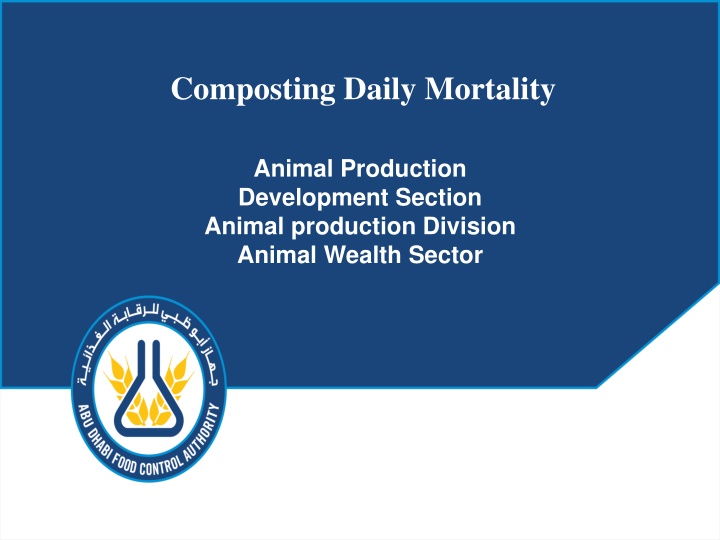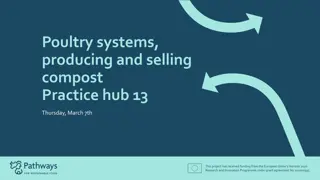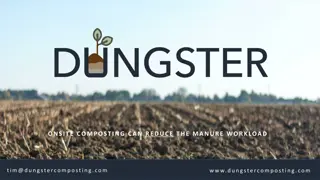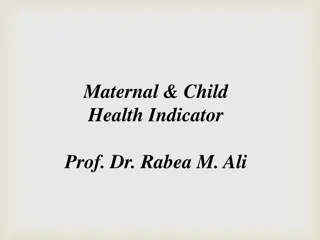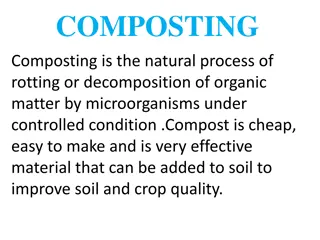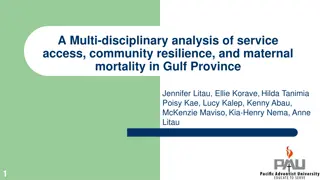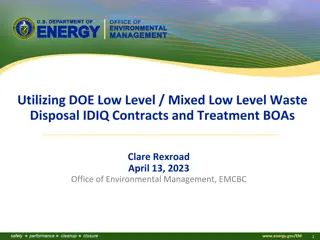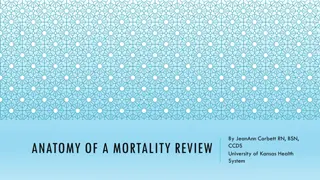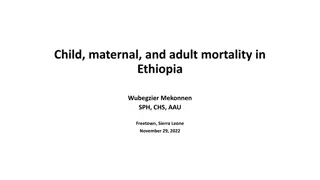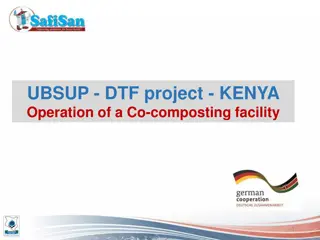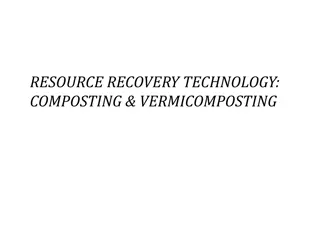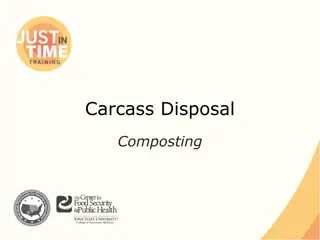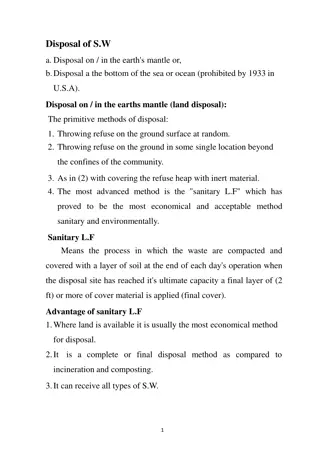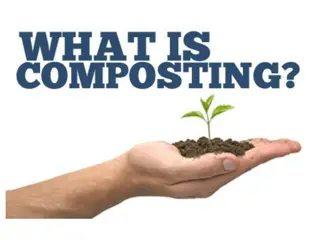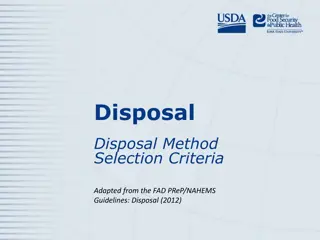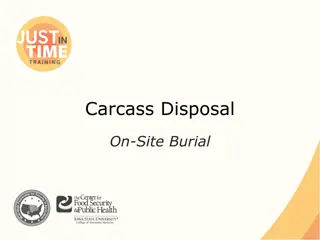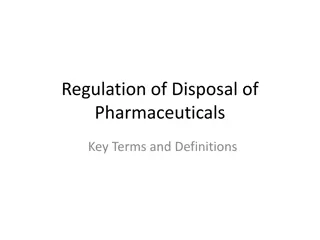Efficient Composting for Daily Animal Mortality Disposal
Composting is a recommended method for disposing of daily animal mortality, offering a natural biological decomposition process under specific conditions. By combining carbon and nitrogen sources with water and oxygen, this method promotes rapid decay, addressing environmental concerns associated with other disposal techniques like burial and incineration.
Download Presentation

Please find below an Image/Link to download the presentation.
The content on the website is provided AS IS for your information and personal use only. It may not be sold, licensed, or shared on other websites without obtaining consent from the author.If you encounter any issues during the download, it is possible that the publisher has removed the file from their server.
You are allowed to download the files provided on this website for personal or commercial use, subject to the condition that they are used lawfully. All files are the property of their respective owners.
The content on the website is provided AS IS for your information and personal use only. It may not be sold, licensed, or shared on other websites without obtaining consent from the author.
E N D
Presentation Transcript
Composting Daily Mortality Animal Production Development Section Animal production Division Animal Wealth Sector
4. Composting daily mortality The use of burial pits has been eliminated as a disposal option in due in part to the discovery of un-decomposed carcasses unearthed years after burial. The utilization of rendering facilities have been limited due to high transportation costs to these facilities and the issue of incorporation of feathers during the rendering process. Abu Dhabi Food Control Authority
4. Composting daily mortality The use of incineration is now popular and is used by alarge number of poultry producers where pits are outlawed. While it is one of the most biologically secure methods of dead bird disposal, the rising price of fuel globally is making incineration a very expensive method of disposal. Incineration also poses concerns of air quality due to particulate emission and odors associated with the process. Abu Dhabi Food Control Authority
4. Composting daily mortality Composting is considered to be a positive method for disposing of daily mortality. It is simply a natural biological decomposition process that takes place under aerobic and thermophilic conditions. Abu Dhabi Food Control Authority
4. Composting daily mortality The composting process is achieved by combining carbon source (e.g. litter, including straw, wood shavings, peanut hull etc.) and nitrogenous sources (dead bird and manure), mixed with water and oxygen to meet aerobic microbial metabolic requirements. The carbon to nitrogen ratio should range from 25:1 to 40:1. Abu Dhabi Food Control Authority
4. Composting daily mortality The process is achieved by layering the carbon source with the nitrogen source until the pile reaches 5-6 feet in height. The process will proceed as the temperature of the pile rises to 140 /to 160/F which will promote the growth of thermophillic microbes which promote rapid decay. The moisture content of the pile should be 40-60%; the process will not operate effectively if the material is too wet or too dry. Abu Dhabi Food Control Authority
4. Composting daily mortality Temperature is one of the most important factors in the composting process and the temperature of the pile should be monitored on a daily basis as this will inform you of the progress of the decomposition process. Oxygen and moisture content within the pile are also important since the microbes involved in the process are aerobic organisms which require oxygen in order to survive. Abu Dhabi Food Control Authority
4. Composting daily mortality Too much moisture in the pile will reduce the oxygen content and convert the environment to an anaerobic one thereby changing the microbial profile resulting in the cooling of the pile and slowing down of the decomposition process slows down. For daily farm mortalities it is recommended that the composting be done in bins in a two phase composting process, which involves a primary phase and a secondary phase. Abu Dhabi Food Control Authority
4. Composting daily mortality The primary phase as the name suggests is the first stage of the process. It involves the rapid increase in temperature up to 140/or more after which it will gradually decline. The primary phase can last from seven to twenty-one days depending on several factors including; temperature, size of birds and source of carbon material. When the temperature drops to below 120 /this marks the end of the primary phase and the pile is reconstituted and turned for the secondary phase. Abu Dhabi Food Control Authority
4. Composting daily mortality The secondary phase is achieved by transporting the compost from the primary bin and placing it in the secondary bin (turning) for a second heating phase. Water is added to the pile if it is too dry and the pile is capped with additional litter to cover any un- decomposed carcass that may be exposed. Abu Dhabi Food Control Authority
4. Composting daily mortality Setting up a compost facility on your farm for daily mortality composting can be as simple as modifying a section of your litter storage facility to a more complex process of constructing a structure specifically for composting. It is recommended that the structure have a roof and concrete floors. The walls of the bins can be either wood or concrete. Abu Dhabi Food Control Authority
4. Composting daily mortality While composting your daily mortality requires more management than the other methods that are practiced, composting makes it possible to transform what would be considered waste into an end product that is easy to transport, easy to store and is in fact a valuable soil amendment. Abu Dhabi Food Control Authority
4. Composting daily mortality Additional information on composting poultry mortality can be obtained at: www.poultry.uga.edu/extension. Claudia Dunkley Extension Poultry Scientist Extension County Coordinator/Agent Abu Dhabi Food Control Authority
